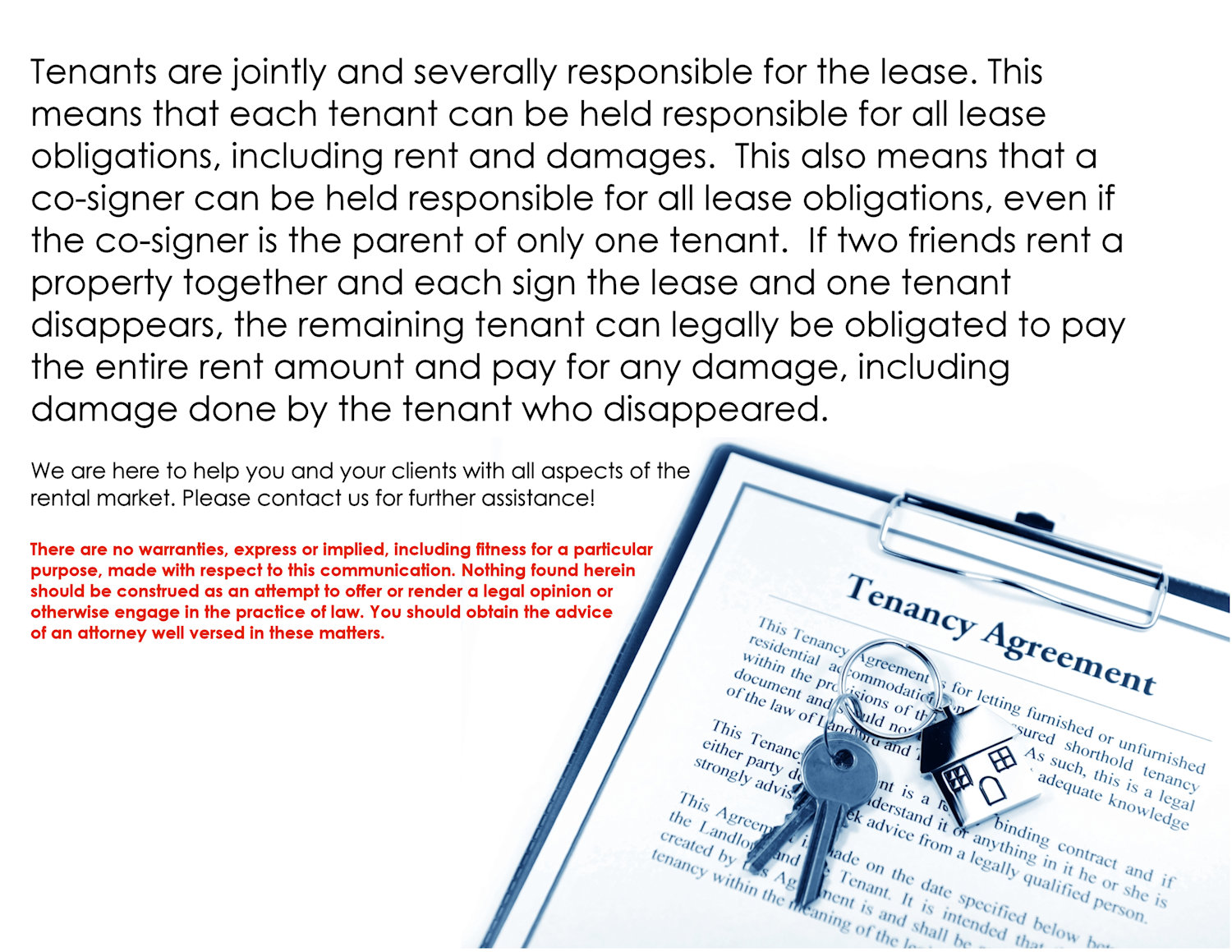
Did you know... •
September 25, 2017
CLEANING FEES – WHO PAYS?
 In Washington State, if a landlord charges a non-refundable cleaning fee, the tenant cannot be charged for any routine cleaning that exceeds the amount of the fee. If cleaning costs exceed the amount of the cleaning fee, the owner will have to pay the difference. On the other hand, if the tenant is charged a refundable damage/security deposit, the tenant can be charged for any overage.
In Washington State, if a landlord charges a non-refundable cleaning fee, the tenant cannot be charged for any routine cleaning that exceeds the amount of the fee. If cleaning costs exceed the amount of the cleaning fee, the owner will have to pay the difference. On the other hand, if the tenant is charged a refundable damage/security deposit, the tenant can be charged for any overage.
RCW 59.18.130 (10) The tenant shall not be charged for normal cleaning if he or she has paid a nonrefundable cleaning fee.
We are here to help you and your clients with all aspects of the rental market. Please contact us for further assistance!
There are no warranties, express or implied, including fitness for a particular purpose, made with respect to this communication. Nothing found herein should be construed as an attempt to offer or render a legal opinion or otherwise engage in the practice of law. You should obtain the advice of an attorney well versed in these matters.
Did you know... •
September 18, 2017
Department of Justice Lawsuit
The Department of Justice (DOJ) recently set tled a lawsuit with a landlord in Edmonds, Washington for refusing to rent to families with children. The complaint was filed with HUD in 2014 and the DOJ just settled the case. The settlement includes the following:
tled a lawsuit with a landlord in Edmonds, Washington for refusing to rent to families with children. The complaint was filed with HUD in 2014 and the DOJ just settled the case. The settlement includes the following:
-
Pay a total monetary settlement of $95,000, comprised of:
-
$35,000 in damages to a family that they turned away because the family had a small child;
-
$35,000 that will be used to compensate other families that were harmed by defendants’ practices; and
-
$25,000 as a civil penalty to the United States;
-
-
Adopt non-discriminatory policies and practices that ensure compliance with Fair Housing Act; and
-
Submit to record keeping and monitoring requirements for the three-year period of the settlement agreement.
We are here to help you and your clients with all aspects of the rental market. Please contact us for further assistance!
There are no warranties, express or implied, including fitness for a particular purpose, made with respect to this communication. Nothing found herein should be construed as an attempt to offer or render a legal opinion or otherwise engage in the practice of law. You should obtain the advice of an attorney well versed in these matters.
Did you know... •
September 12, 2017
SEATTLE LANDLORD/TENANT UPDATES
There have been updates to the handout landlords are required to provide to Seattle tenants. This handout includes summations of both Seattle and state landlord tenant regulations and must be provided to tenants at move in, annually and whenever changes are made to it. Emailed copies to current tenants is sufficient. The updated packet includes information about recent changes to Seattle ordinances such as limits on move in charges and the tenant’s right to pay move in costs in payments. It also includes information about registering to vote. The updated pamphlet can be found here:
https://tinyurl.com/Seattle-Law
We are here to help you and your clients with all aspects of the rental market. Please contact us for further assistance!
There are no warranties, express or implied, including fitness for a particular purpose, made with respect to this communication. Nothing found herein should be construed as an attempt to offer or render a legal opinion or otherwise engage in the practice of law. You should obtain the advice of an attorney well versed in these matters.
Did you know... •
August 29, 2017
SEASONAL RENTAL MARKET – WASHINGTON
In this area, the rental market is very seasonal. The greatest demand is typically during the summer months and slowest during the holiday season. While rents are still high, the seasonal slowing is starting earlier than usual this year. This is believed to be due to the number of new apartments in the area. In the last five years, more new apartments have opened in the Seattle area than in the last 25 years combined. New apartments are offering significant move in incentives – more than doubled what was being offered six months ago. These are affecting even the single-family home rental market.
We are here to help you and your clients with all aspects of the rental market. Please contact us for further assistance!
There are no warranties, express or implied, including fitness for a particular purpose, made with respect to this communication. Nothing found herein should be construed as an attempt to offer or render a legal opinion or otherwise engage in the practice of law. You should obtain the advice of an attorney well versed in these matters.
Did you know... •
August 21, 2017
Seller Remains AFTER closing – Washington State
Due to the current sales market, we’re seeing a significant increase in sellers maintaining possession post-closing. NWMLS form 65B, for seller occupancy after closing, states in the instructions that, “post-closing occupancy is risky,” and recommends that buyers not give sellers the right to occupy after closing.
If you have buyer clients contemplating allowing the seller to remain after closing as a negotiating tactic, here are a few things your client should consider:
-
After closing the Residential Landlord Tenant Act (LTA) applies. The buyer becomes a landlord and the seller becomes a tenant. Per the LTA, the landlord must maintain the property, so if something breaks, the buyer will have to fix it.
-
Per the LTA, the buyer/landlord has the “reasonable” right to inspect the property. The seller/tenant has the right of quiet enjoyment. These two rights can sometimes be in conflict.
-
If the buyer wants the seller to pay a damage/security deposit, then, per the LTA, a move in inspection form must be completed – even though the property is already occupied. The deposit must be held in a trust account as usual.
-
The buyer will need to notify his/her insurance company that the seller/tenant will be remaining in place. If there is a claim and the insurance company doesn’t know this, they may deny the claim.
-
The NWMLS recommends that if the period of occupancy will be for more than a short period of time, that a full lease form, NWMLS 68, be used instead. They also recommend referring your client to an attorney.
We are here to help you and your clients with all aspects of the rental market. Please contact us for further assistance!
There are no warranties, express or implied, including fitness for a particular purpose, made with respect to this communication. Nothing found herein should be construed as an attempt to offer or render a legal opinion or otherwise engage in the practice of law. You should obtain the advice of an attorney well versed in these matters.
Did you know... •
August 14, 2017
The Fair Tenant Screening Act
The Fair Tenant Screening Act prohibits landlords from charging an applicant for screening without first posting or notifying the applicant in writing of the criteria that will be used to screen applicants? This must include:
-
What type of information will be accessed to conduct the tenant screening;
-
What criteria may result in denial of the application; and
-
If a consumer report is used, the name and address of the screening company and the applicant’s right to get a free copy of the report in the event of denial or other adverse action and to dispute the accuracy of information in the report.
Landlords must get a signature from the applicant showing that they have seen the criteria that will be used to determine the outcome of the application.
We are here to help you and your clients with all aspects of the rental market. Please contact us for further assistance!
There are no warranties, express or implied, including fitness for a particular purpose, made with respect to this communication. Nothing found herein should be construed as an attempt to offer or render a legal opinion or otherwise engage in the practice of law. You should obtain the advice of an attorney well versed in these matters
Did you know... •
July 31, 2017
2017 SURVEY OF RENTERS
The results of a recently released 2017 survey* of renters reveals tenant priorities. In this survey, 35% of tenants were in single family rental homes, the rest in multi-family. 32% of tenants had dogs, 30% had cats and 10% had other pets. The top amenities that renters said are worth paying more for are:
-
Pets allowed
-
Neighborhood
-
Covered parking or garage
-
Walking distance to amenities
-
Laundry facilities
When deciding which rental to choose, the top feature was location, closely followed by price. The number one reason for leaving was life changes (marriage, job change, etc.). Number two was rent increases and number three was purchasing a home.
We are here to help with all aspects of the rental market. Contact us for more information.
There are no warranties, express or implied, including fitness for a particular purpose, made with respect to this communication. Nothing found herein should be construed as an attempt to offer or render a legal opinion or otherwise engage in the practice of law. You should obtain the advice of an attorney well versed in these matters.
*Source: Buildium
Did you know... •
July 24, 2017
CAP-RATES & INVESTING
Investor clients often want to know the capitalization (cap) rate of a potential property. Cap rate is net operating income (NOI) divided by the sales price or value of the property. NOI is gross annual income minus operating expenses, but not including income taxes and mortgage.
Cap rate = NOI/current market value.
A five-unit apartment building with gross monthly rents of $3,750 would have a maximum gross annual rent of $45,000 ($3,750 x 12 = $45,000). If the total annual expenses were $25,200, the NOI would be $19,800 ($45,000 – $25,200). If the sales value of the property was $450,000 the cap rate would be 4.4% ($19,800/$450,000).
This link will take you to a free online cap rate calculator. (Calculator is for informational purposes only and has not been verified for accuracy)
The cap rate is a more useful tool in multiplexes and commercial real estate than with single-family homes or small apartment buildings. Although small apartment buildings will often use cap rate in advertising media. The average operating expenses will be more consistent when there are multiple rental units rather than only a few. And, of course, most investors will want to know what their return will be after the mortgage is paid.
We are here to help with all aspects of the rental market. Both residential and commercial.
Contact us for more information.
There are no warranties, express or implied, including fitness for a particular purpose, made with respect to this communication. Nothing found herein should be construed as an attempt to offer or render a legal opinion or otherwise engage in the practice of law. You should obtain the advice of an attorney well versed in these matters.
Did you know... •
July 17, 2017


 Facebook
Facebook
 X
X
 Pinterest
Pinterest
 Copy Link
Copy Link
 In Washington State, if a landlord charges a non-refundable cleaning fee, the tenant cannot be charged for any routine cleaning that exceeds the amount of the fee. If cleaning costs exceed the amount of the cleaning fee, the owner will have to pay the difference. On the other hand, if the tenant is charged a refundable damage/security deposit, the tenant can be charged for any overage.
In Washington State, if a landlord charges a non-refundable cleaning fee, the tenant cannot be charged for any routine cleaning that exceeds the amount of the fee. If cleaning costs exceed the amount of the cleaning fee, the owner will have to pay the difference. On the other hand, if the tenant is charged a refundable damage/security deposit, the tenant can be charged for any overage. tled a lawsuit with a landlord in Edmonds, Washington for refusing to rent to families with children. The complaint was filed with HUD in 2014 and the DOJ just settled the case. The settlement includes the following:
tled a lawsuit with a landlord in Edmonds, Washington for refusing to rent to families with children. The complaint was filed with HUD in 2014 and the DOJ just settled the case. The settlement includes the following: